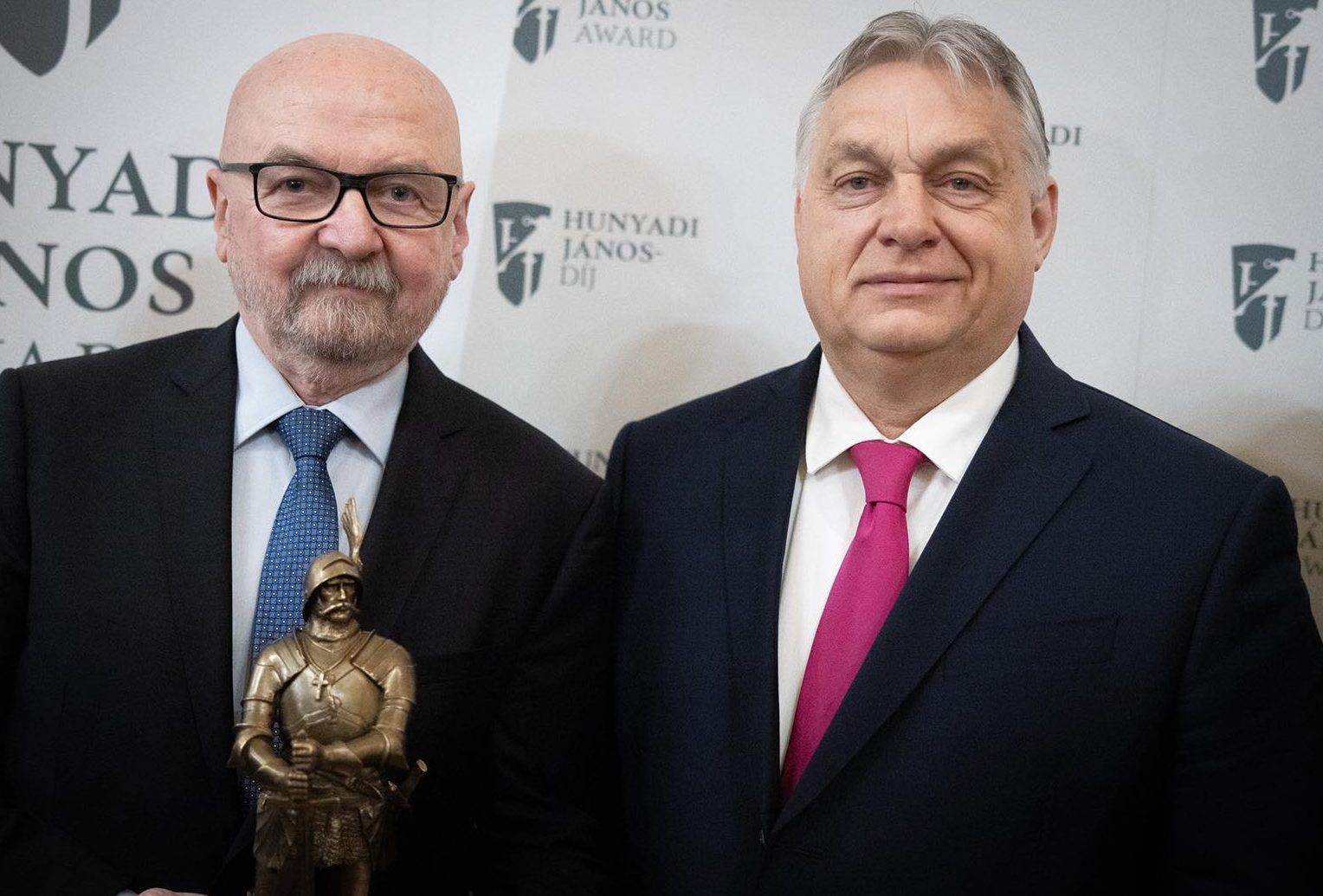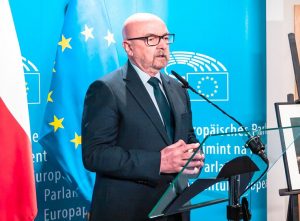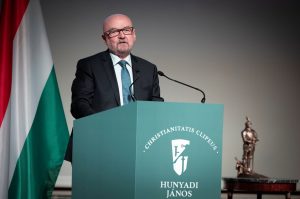
The Prime Minister awarded Professor Ryszard Antoni Legutko at the event of the Foundation for a Civic Hungary.Continue reading
Last month, Professor Ryszard Legutko was awarded the János Hunyadi Award by the Foundation for a Civic Hungary (PMA) for his outstanding work in defense of European values. He was presented the award by Hungarian Prime Minister Viktor Orbán in Brussels. We have asked Prof. Legutko about the future of Polish-Hungarian relations, his struggle for European conservative values, and about the pressures national conservative governments are currently facing due to the institutional hegemony of the European left.
Prof. Legutko is a Member of the European Parliament, he is head of the Polish Law and Justice delegation, and the co-chairman of the European Conservatives and Reformists.
Congratulations on the János Hunyadi Award! You have been awarded the prize for standing up for the principle of national sovereignty and Christian values. Where do you find the inspiration, courage, and moral strength to defend these principles consistently in an increasingly hostile political environment, both in Brussels and at home?
Thank you for the congratulations. The award gave me great satisfaction, and the ceremony was most impressive. As to your question, the answer is simple. I can say I was immunized against the progressivist propaganda early on in my life: first, through my upbringing, then through the books, and finally, through experience in the communist system. The EU environment is increasingly hostile – you are right – but, on the other hand, it is the parliamentarian’s job and obligation to speak out. Since I have been writing, speaking, or lecturing for decades, the word, whether spoken or written, is something I value very highly. For a person like myself, the word is a part of me, so here, any compromise or selling out would be detrimental to myself. Besides, after so many years in the European Parliament, I feel that many of my colleagues expect certain things to be said forcefully and openly, even if those words do not have an immediate effect. The amount of manipulation, half-truths, falsehoods, and newspeak mumbo-jumbo is so great that a word of truth – from time to time – is necessary.

Facebook, Prof. Ryszard Legutko
Today, accepting a recognition from a Hungarian foundation can create a certain air of suspicion, not only within liberal circles, but also in your own party, where there may be those who seem to prefer to keep our historic alliance at arm’s length at the moment. Does it require an amount of courage nowadays from a Polish politician to reaffirm his shared values with the Hungarians?
The answer is no. But you are right that the information about the award provoked a lot of unpleasant comments. “You must be disappointed that it was not Putin who presented you with the award, but Orbán,” was one of several comments of this kind that I received. But in the conservative circles, the reaction was warm and sympathetic.
The Polish conservatives are aware that whatever the differences between us and Fidesz, we are good and strong allies and that this alliance is long-term, not short-term.
The Leviathan from Brussels casts its ominous shadow on the entirety of Europe, and we, therefore, have to stand united to defend ourselves and counter-attack. This is a simple but vital truth. Hungary is all the more important to us because we not only have a common interest in opposing the EU’s unquenchable appetites, but also a common interest in Eastern and Central Europe.
After last year’s elections, Poland abandoned its leading role in defending conservative values in Europe and moved in a Euro-federalist, Atlanticist direction. But cautious observers could already detect such a trend under the Morawiecki government, during which the cohesion between our countries was palpably weakened. Do you see any truth in this, or do you not think that the war in Ukraine has hit the Polish conservatives in their Achilles heel?
I am not sure the Morawiecki government was in favor of the centralization of the EU, though I agree that he made errors when he yielded to the pressure, in particular regarding Fit for 55 and the conditionality mechanism. Perhaps having a long and successful experience in financial markets, he believed that one can always reach a compromise with one’s competitor. The error was that the EU never is and never was interested in a compromise, but will do anything to have its way. But again, other countries from this part of Europe, Hungary included, have not had much success in opposing the EU steamroller. Poland and Hungary did not veto but filed a suit against the conditionality mechanism with the European Court of Justice, which was a political naivete. To my knowledge, the ECJ has never ruled in favor of a Member State against the European institutions in important matters. The current Polish government is entirely dependent on, and subservient to Brussels and Berlin, which constitutes a mortal danger to our sovereignty.
The weakening of the Budapest-Warsaw relations during the Morawiecki government was due to the differences in Poland and Hungary’s attitude to the war in Ukraine and to Russia. Here our national interests clearly diverge. It should be remembered that the anti-centralist parties from ECR and ID had a series of meetings that was to result in a common statement specifying our proposal to change the treaties with a view to block or even reverse the process of centralization. A lot of work was done, but then the war in Ukraine changed it all. The only proposal to change the treaties came from the other side, with the predictable conclusion.
The Orbán government has come under criticism for openly siding with one side of the US political spectrum. Mr. Morawiecki and your party, on the other hand, have chosen to ignore the fact that there are two opposing Americas that exist today. It seems that the Biden administration exploited this for its own geopolitical interests in relation to Russia, but then stabbed Polish conservatives in the back during the elections. Do you see any lessons to be learned from the electoral victory of the Polish globalist forces and PiS’s policy of trust towards the Biden administration?
Poland has always had a clear pro-Atlantic orientation. The Morawiecki government was more involved in this strategy than the current one. However, making a strong case for America’s presence in the security system in Eastern and Central Europe distinguished Poland’s position from the position of other EU countries, particularly from Western Europe. And yet, siding with the US is not without problems. It was a PiS assumption that we have to be in good relations with each American administration, irrespective of the party in power.
Both Democrats and Republicans are difficult allies.
The Democrats were more involved in the anti-Russian policies after the war broke out – which we welcomed – but radically leftist in a culture war and seeking like-minded allies – which was against our interest. The Republicans had a soft spot for Russia and Putin but had a more sensible approach in other matters. The Democrats were more interested in Europe but supportive of the EU and its agenda, while the Republicans tended to be isolationist and critical of the EU. The choice was not easy, and whatever the decision, some unpleasant consequences always followed. Besides, the Americans have been known for their arrogance.
The US ambassadors in Poland have behaved abominably, almost like their Soviet counterparts in the past.
This goes for both Trump’s and Biden’s nominees. The current ambassador, Mark Brzezinski, son of Zbigniew Brzezinski, is a despicable figure in that respect. But his predecessor was no better.
Perhaps the essence of János Esterházy’s message, who in many ways connects the Polish and Hungarian nations, is that national politics cannot be built on hatred of another nation. Not only because there are moral obstacles to doing so, but mainly because it makes one vulnerable to attacks from the enemies of national sovereignty. Do today’s conservative Polish politicians understand this principle?
Hungary continues to be one of the most liked nations in Poland, and Hungarian-Polish friendship has been one of those ideas that most Poles cherish. I do not see how it could change in the foreseeable future. It is true that among the EU fanatics, mostly from the Left and Civic Platform, Viktor Orbán has become a sort of Schwarzcharakter (“hate-figure,” ed. note) in the way Jarosław Kaczyński is. They buy everything which comes from Brussels. No such hostile sentiments exist on the conservative side. The conservatives respect Orbán and support him in Hungary’s battles with the EU. To make a more general point, I do not think the Poles hate any nation. Perhaps the opposite is the case.
I would say there is too much sentimentalism in our attitude toward other nations, even those that did us a lot of harm – the Germans, Russians, and Ukrainians.
Our attitude to the Ukrainians is a case in point. The Poles massively helped the Ukrainians and hoped for some kind of reconciliation. This did not happen, and whether it will happen in the foreseeable future, I am not sure. On the whole, I am a pessimist regarding Polish-Ukrainian relations.
At the moment, the intransigent 2+2 within the Visegrad 4 only favors the anti-sovereigntist, progressive forces. How can we achieve a common platform where the decisive criterion for the relationship and friendship between our nations is not exclusively our stance towards Russia?
V4 has had its ups and downs, and I generally do not think it has ever played the role it could play. Theoretically speaking, there is a lot of political potential in it. I am sure that a block of states from Eastern and Central Europe representing the interests of the region could substantially modify the political architecture in Europe. It could, but so far it has not. I had an indirect confirmation of V4’s potential power when I accompanied Jarosław Kaczyński in his meeting with Angela Merkel. It was the time when the V4 revived and looked promising. Angela Merkel could hide her irritation at its growing influence, which would undermine Germany’s leading position. Unfortunately, this is no longer the case today, and V4 fell into slumber again. Generally speaking, the major difficulty is that we are too timid to try to be an important political actor.
Poland is deeply divided between the sovereigntist and anti-sovereigntist orientations. Our current government would rather cajole the Germans than stand up against their domination. In other countries, the situation is similar or even more complicated. Hungary’s Russian policy did not help to consolidate the V4, but I agree that this is not the only problem. Even without the war, V4 would have had to change a lot to become what it should be.
Hungary’s euro-funds are still frozen in the EU, but Poland has received its 137 billion. From the point of view of conservative Hungary, we are more concerned about this than wistful, being aware of the fact that there is no free money from the EU, and this could directly and adversely impact the question of national sovereignty. Did you welcome the news or were you more concerned about the unfreezing of funds?
The whole recovery plan was a trap. Unfortunately, the previous Polish government decided to go for it. On the other hand, if it had decided otherwise, it would have been furiously attacked by the liberal opposition that it rejected the EU’s helping hand. It is extremely difficult to conduct a policy of sovereignty when the EU has massive support among the population, support that is completely unfounded and misplaced. To conduct a European policy in such a country is like walking on a tightrope. One cannot make a careless move. However, once the government accepted the recovery plan, it became a hostage of the EU’s vicious practices. In hindsight, one can say that we should have kept out of the European funds, but the judgment of hindsight is always easy. The Tusk government received some handouts from the Commission, and there were promises of some handouts. This has not changed much: this government has been consistently acting against Poland’s sovereignty, so receiving or not receiving some funds does not really matter. Economically, the funds are of no consequence, and the government’s servitude to Brussels and Berlin will remain as deep as ever.
In 2019, PiS came first among young voters with 26% of the vote share. At the last elections it finished last with a mere 14.9%. How did Polish conservatives manage to lose their youth? What is the lesson for Hungary that you could pass on?
I cannot answer this question. This is not my area of competence. From what I hear, PiS indeed failed to be sufficiently active in social media. But – I repeat – I write only from hearsay. My opinion is that there was young people’s tide away from the conservative platform irrespective of the errors or negligence. In a way, this was a by-product of our political success and a widespread sense of security. In such an atmosphere, the anti-establishment revolt is fairly easy to provoke: to be against the government is cheap, safe, and fashionable, something young people are particularly prone to fall into. But the problem is there. Young people are volatile, and it is imperative that they should be saved from the harmful idiocies that are being pumped into their heads every day.

Ryszard Antoni Legutko, who was awarded the János Hunyadi Prize of the Foundation for a Civic Hungary, speaks during the award ceremony at the Concert Noble in Brussels on March 20, 2024. Photo: MTI/Prime Minister’s Press Office/Fischer Zoltán
Despite the strained relations under Morawiecki, there is no “we told you so” sentiment towards the Poles among the ranks of the Hungarian right. On the contrary, conservative Hungary is asking itself how can we stand up for the Poles at this difficult time. How can we effectively support Polish non-globalist forces today?
Again, this is a question I am unable to answer. What I know is that PiS and Fidesz are the only truly conservative parties in the region and in Europe. In Western Europe, conservatism is either diluted or marginalized. This gives us particular responsibility continent-wise. Cooperation between the party that is in power, like Fidesz, and the party that is in opposition, like PiS, is not easy, but it has to continue. The priority is to resume the initiative that was cut short after the outbreak of the war: to come up – with the collaboration of other right-wing parties – with a clear proposal to reform the EU: three or four concrete proposals that could become a rallying cry of the common-sense forces and be a part of political discourse in Europe. To say that we are against the change of the treaties towards greater centralization puts us on the defensive. We should be on the offensive with the intention of depriving the EU of some of its powers and thwarting its sick ambitions.
Featured Image: Facebook Prof. Ryszard Legutko